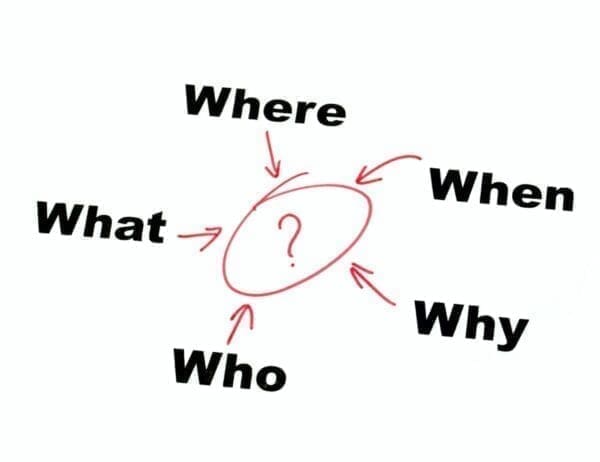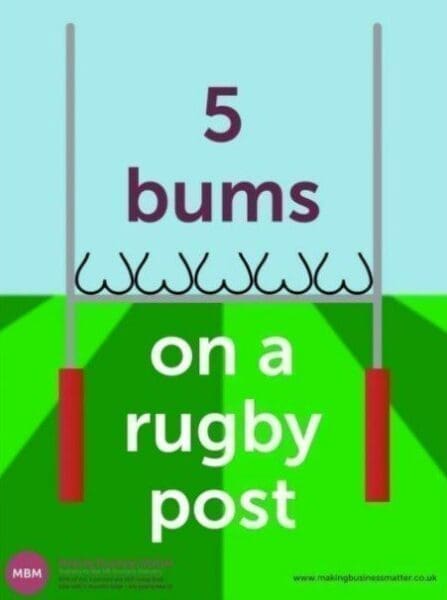Why Are We So Bad at Asking Questions?
Why are sales people generally so rubbish at asking questions? Well, there’s a question and a statement both rolled up into one!
To be fair it’s not just sales people who are generally poor at asking questions it’s all of us. Why? Well, it’s familiarity breeding contempt and complacency.
We think we are all experts at asking questions because we literally ask them all the time. The first words you uttered this morning as you woke up in bed are almost guaranteed to have been a question:
‘What time is it?’
‘Whose making the tea?’
‘What are you up to today?’
Or even….
‘Who the on earth are you?!’
During the average day, we ask hundreds and hundreds of questions. We ask so many that we usually don’t even think about them. They just splurge out in an endless torrent with little or no structure let alone with a clear end in mind.

The Sales Question from Hell!
‘So, how’s business?’
That one most overused, under thought through question, used to make me inwardly want to cause grievous bodily harm to the salesperson that could possibly ask such an inane, badly thought through, casual and sloppy question.
However, as a buyer, I probably heard it at least 20 times a day…. not only from my NAM’s but often from colleagues or even the boss! That question goes to the heart of the reason for this article.
‘So, how’s business?’ is not structured, has no target, the response could be almost anything and is unlikely to help you succeed in what you are in the meeting (or phone call or zoom or email) to achieve.
There is however one profession sales people can learn from. A profession that is clinical in its use and application of questions in order to achieve its goals….
Learn From a Barrister
No, not those lovely people that make your morning double macchiato with skimmed soy milk and a shot of caramel but the legal profession.
Whether they are prosecuting an alleged crime or defending an innocently charged fine upstanding member of the public, a barrister’s job is to solely focus on asking questions that help lead to the outcome they want for their client. Guilty or innocent they only ever ask carefully constructed, clinically worded very targeted questions aimed at eliciting the exact response they had planned for.
As a salesperson or NAM your job is to lead your buyer by careful questioning to say exactly what you want them to say…
- ’Yes, I’ll list your product(s)’
- ‘The promotion is agreed’
- ‘No don’t worry about the £20k advertising fund I’m waiving it’ (and pigs might fly!).
So, the effective sales manager uses questions as weapons – carefully prepared, well-aimed and expertly fired to hit the target and bag the prize.
A barrister will typically start their inquisition with a broad open but not too wide-open question to draw the witness into the subject zone they want to focus on. Subsequent questions will then ‘funnel’ down, becoming ever more closed and precise to ‘trap’ the witness into confirming exactly what the barrister wants them to confirm.
Watch a trial drama on telly – there are loads of them – the questioning is so precise, so targeted and when done well like it is like watching a well oiled machine smoothly churning out the exact specification of a product. Time after time.
Preparation, Preparation, Preparation
Most NAM’s spend a great deal of time preparing for an important meeting with one of their buyers. However, my experience is that typically 90% of that preparation time is spent on carefully crafting and honing a fabulous looking deck of slides. The remaining 10% is then spent on crunching the numbers, thinking briefly about the negotiation that may (hopefully) ensue and normally precious little about questioning strategy.

You should spend a good 30 minutes before any important meeting thinking about your questioning plan or strategy.
Firstly, and crucially, what do you want to achieve from the meeting? Hopefully your objective was the start point of the whole planning process before you dived into copying and pasting Marketing’s last slide presentation (yes, we all know you do that!).
- How will that objective be better achieved with a well thought out questioning plan?
- What do you want them to say ‘Yes’…or possibly ‘No’ to?
- How will your questions ‘lead’ them along the path you want?
- What is the right balance of Open and Closed questions?
- How do you expertly ‘funnel’ them to the outcome you want?
Sticky Learning ® is 7 times more effective than 1-day training courses. Plus, you will get a Chain of Evidence proving your Return on Investment. Discover soft skills training that changes behaviours long term.

Open and Closed Questions
Just about everyone intrinsically understands the difference between open and closed questions but just as we started this article people are incredibly blasé if not lazy about their structured use of open and closed questions
Open Questions
Open questions are there to elicit information, to get the other person to ‘open up’ and expand on a subject.
- ‘How are the buy one get one free promotions currently performing?’
- ‘Please could you explain how your new merchandising policy is affecting the layout of your smallest convenience stores?’
- ‘What is your strategy for implementing with the new high fat, salt and sugar legislation?’
- ‘How are your plans for rapid grocery deliveries progressing?’

The 5 Bums on a Rugby Post idea allows you to remember to ask open questions by starting with Who, What, Why, When, Where or How.
Closed Questions
Closed questions by contrast have straight, simple ‘Yes’ or ‘No’ answers. These questions are used for confirming details, gaining agreement (or disagreement) and ensuring everything is understood.
- ‘Are your stores closed on Boxing Day?’
- ‘Is it correct that the gate fee for a promotional gondola end in all stores is £10k?’
- ‘Do we have an agreement on the listing of the products I have just proposed to you?’
- ‘Will the new lines go into stores on the 19th of this month?’
Now see if you can guess which type of questions people who don’t plan their questioning strategy most often use?
Correct! Closed questions.
Why? Well because closed questions don’t take a lot of thought, effort, or energy to ask – they just ‘splurge’ out of people’s mouths and can be quite infuriating for the recipient particularly when faced with a non-stop 20-minute barrage of them!
20 Questions Family Favourite
Try playing that great traditional post-Christmas lunch family favourite – 20 questions. Remember the one? Someone gets a card stuck to their forehead with the name of a famous person, place or thing written on it and they have 20 questions to guess exactly what it is that is written on the card. You will very quickly notice that people revert very quickly to closed, confirmatory questions.
- ‘Is it a person?’
- ‘Are they alive?’
- ‘Are they a famous politician?’
- ‘Is it Winston Churchill?’
Rather than much more efficient, powerful, exploratory open questions that instantly glean so much more information from which to successfully guess who, what or where it is.
- ‘What unique or special characteristics does this person, place or thing have?’
- ‘What specifically what makes this person, place or thing famous?’
- ‘Where would I go to find this person, place or thing?’
- ‘How would you describe this person, place or thing if you had 500 words in which to do it?’
That last open question is the slam dunk gold plated ‘get it in one’ question winner – makes the remaining 19 questions you have totally superfluous. Try not giving away what the person, place or thing is when you have to describe it in 500 words!
Use Your Open Questions
So good open questions are so much more powerful than short, sharp closed questions as they should give you so much more information with which to work.
The recipient, your buyer, will also appreciate open questions as it gives them the opportunity to do what most of them like doing best – talking!
Open questions engage the other party, they show that you are interested in their views and opinions, and they are therefore much more likely to empathise and engage with you. Often an objective in itself with a taciturn, grumpy, arms folded tut tutting buyer!
Balance Your Questions – Master the Art of ‘Funnelling’
We now return to our resident experts – the legal profession and barristers in particular. As already mentioned, watch a good courtroom drama on telly and you will see the practised art of ‘funnelling’ on full, glorious display.
We have already seen that open questions are in fact the best and most effective and efficient at eliciting key information, but they do have a potential downside.
Watch Out For the Rabbit Holes!
If you ask too wide an open question, particularly at the start of the meeting you could very well end up taking a long and twisty route down an irrelevant rabbit hole.

Asking your buyer – ‘how is your strategy is evolving for next financial year’? could very well take you down a literal rabbit hole of – ‘well we are starting to develop plans to sell live pets in our largest store, we think it is a channel we can develop and thrive in’ Not especially helpful to you if you are trying to get a listing for your new carbonated soft drink range!
So, in your pre-meeting question planning think very carefully about your first open question and remember it’s not ‘how’s business?’
It should be sufficiently open and wide-ranging to get the buyer to open up and start talking and engaging with you but be sufficiently specific so as not to get the conversation dragged down an irrelevant rabbit hole.
Not Too Wide…
- ‘What are your plans for carbonated soft drinks promotions next year?’
- ‘How will you amend promotional mechanics in the light of the new high fat, salt and sugar legislation coming into force from April/October next year?’
- ‘When and how will you update the trade on your new concept store that we see you are building?’
- ‘Where are you with your plans for dual siting carbonated soft drinks with crisps and snacks in your smaller convenience stores?’
All these open questions make it clear that you have a start point in mind. Something that grounds the conversation in the general vicinity of what you wish to talk about. Just as a barrister would start with ‘so please could tell the court where exactly you were on the night of the 17th?’
Progress Smoothly Down the ‘Funnel’
Now you have established the ‘ground rules’, the start point of your conversation you need to skillfully lead your buyer (the witness!) to the final 64 million dollar question. The final closed question that you want them to of course say a big resounding ‘YES’ to.
Continue asking open but increasingly more specific questions that lead as directly as possible to the confirmatory close that you want. This shows planning and purpose, builds your confidence and shows the buyer you are efficient and effective and someone who hopefully they want to do business with.
Open question – ‘So thinking about next years carbonated soft drinks promotional plan which mechanic do you think will be most effective at driving repeat weight of purchase?’
Closed confirmatory question – ‘Do you have any evidence that confirms that?’
Open specific question – ‘Which of the proven weight of purchase driving mechanics do you think would work best for our proposed range of products?’
Closed confirmatory question – ‘is that something we could work on together?’
Fingers and toes crossed you hopefully receive the all-important ‘YES’ answer. Which will nail their acceptance of the 2 for 1 multi buy promotional package that your sales director had told you to get away with this particular customer come hell or high water and or else!
This is the true skill of questioning – being able to balance and funnel your questions. To be able to expertly ‘lead the witness’ into saying exactly what you wanted them to say as you were planning the meeting at the outset.

And If Things Go Awry?
Best laid plans and all that. You will not always get (in fact you may rarely get!) a helpful buyer that is happy to be ‘led’ no matter how subtly you pose your questions. Your questions may hit a dead-end for genuine or tactical reasons.
- ‘We tried that last year and it didn’t work’.
- ‘You wouldn’t be able to handle the volume uplift that sort of promotion delivers’.
- ‘We have already allocated (sold) those promotional slots to your competitors’.
- ‘You will need to sharpen your pencil if you want me to even consider you for the 2 for 1 promotional campaign’.
So, in your preparation be ready with alternative approaches and questions. If one particular ‘funnel’ does not gain traction try a slightly different. Or more open question start point always remember you can always throw an open question back at your buyer. ‘So what do you think we should do then?’
Any Questions…. About Questions?
We have focussed in this short article on the most basic of questioning techniques. The balanced use of open and closed questions and the barristers’ best trick of ‘funnelling’ towards their desired end or outcome.
On an initial read, it may seem almost childishly basic because it’s what we do all day every day. But do it badly as we so often do and up against a busy, grumpy, tactically trained buyer you may come badly unstuck and be unsuccessful.
A few well-invested minutes formulating a clear questioning strategy based on a clear outcome will give you more confidence. And will equip you with a powerful set of questions with which to succeed in whatever you are trying to achieve
Action: Check out our ultimate guide on People Management Skills.
Best of luck!




